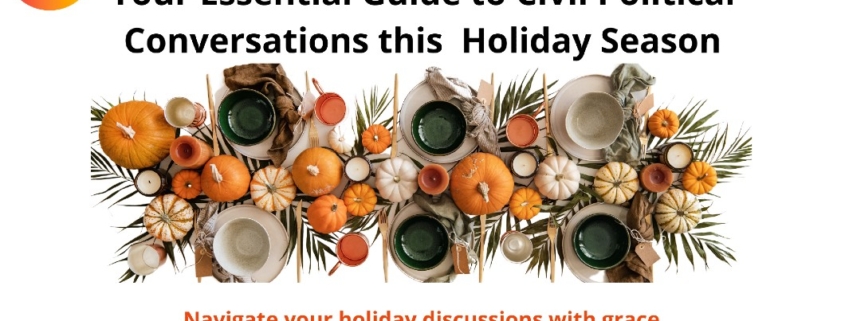Your Essential Guide to Civil Political Conversations this Holiday Season
Around many dining tables this holiday season, there’ll be an extra guest in the room. The elephant, of course. Politics, and all the differing opinions about the tumultuous events of the past year.
We live in divisive times, and unfortunately, our difficulty reaching across the aisle can extend to reaching across the table. Whether or not your gatherings this year include extended relatives, conversations, even among immediate siblings, parents, and significant others, can cover a lot of rocky terrain over a long day and evening.
This year might seem a lot more fraught than most. But the same guidelines for civil conversations apply, even leaving room for constructive disagreement. Let’s have a look at the attributes of folks who seek to meet on common ground, rather than simmer in the far corners of the room.
Tap into the power of listening
The importance of listening in productive dialogue should not be underestimated. It’s through active listening that both parties feel heard and validated, which in turn enriches conversation and cuts unnecessary tension. Listening first this holiday season can help you make connections, find empathy, and put you in a better position for meaningful discussions around the dinner table. Without listening, it can be easy to get stuck in arguments and never reach common ground. In order to save more time for food and merriment, consider using the power of listening when engaging with family and friends this year.
Commit to seeking agreement rather than “winning”
It’s difficult to achieve a balanced conversation based on connecting with someone if you’re constantly formulating your next retort. You have to actively listen to their points, rather than crafting your own retaliation. You never know — you might even find yourself swayed a bit by their insights. You don’t have to aim to end the night by winning or losing and certainly not by compromising your principles. You just have to get to a civil place where you can agree to disagree and pass the cranberry sauce with a pleasant expression.
Remember it’s possible for good people to disagree
We all have very different backgrounds that make us who we are and have shaped the principles we hold firm. But different values and beliefs aren’t synonymous with good and bad. Very different formative experiences can create strong, fundamental differences. If you sense you aren’t going to be able to meet amicably in the middle with this person, perhaps it’s best to find a pivot to another aspect of the conversation.
Use facts, not emotion
Emotional arguments aren’t a great basis for a conversation, because if both people are speaking from the heart in heated opposition, it’s hard to arrive at the conclusion that it’s possible for good people to disagree. If you have good facts, figures, and statistics, open your toolbox and use them. But let the other person do the same — and if theirs are solid, acknowledge that, even if it doesn’t fit well with your narrative.
Bring down the temperature
If you find the conversation becoming too heated, do whatever you can to de-escalate a potentially hostile situation. Name-calling and tossing around stereotypes are indicators that things are traveling in the wrong direction. Don’t give in to the temptation to reciprocate with pejorative terms of your own. Storytelling is one way to grab attention — just make sure the takeaway is one of neutrality or learning something unexpected. And remember – family is always more important than politics.
Want more tips on healing the divide over Thanksgiving or any gathering? Watch our webinar “Ten Ways to Heal the Divide,” with Living Room Conversations founder Joan Blades and founder of Bridge USA, Manu Meel, moderated by Common Ground Committee co-founder, Bruce Bond.






